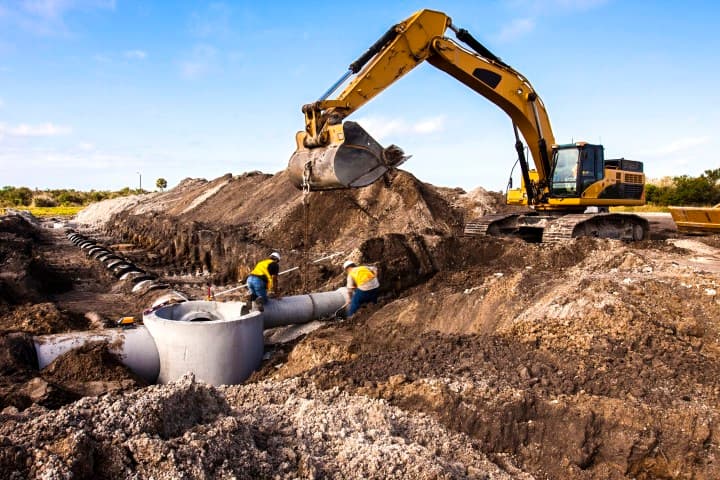If you're interested in a hands-on career with great job security, you might want to learn how to become a pipefitter. With opportunities for steady work and the chance to solve complex problems, pipefitting is a rewarding trade for those who enjoy working with their hands.
Ready to kickstart your pipefitting career? Sign up for a free SkillHero account to access valuable resources, training, and job opportunities in the trade. Then keep reading to learn more about becoming a pipefitter in the United States so you can create a step-by-step plan.
What is a pipefitter and what do they do at work?
A pipefitter is a skilled tradesperson who installs, assembles, maintains, and repairs piping systems. This can include working with pipes made of various materials such as steel, copper, and plastic. A pipefitter may work in a variety of settings, including industrial facilities, construction sites, and commercial buildings.
On a typical day, a pipefitter might start by reviewing blueprints and specifications to determine the layout and installation requirements for a piping system. They would then measure, cut, and thread pipes to fit the design, and use welding, brazing, or soldering equipment to join pipes and fittings.
Pipefitters also inspect and test installed systems for leaks and ensure that they meet government standards and building codes. They may be required to collaborate with other tradespeople such as electricians and HVAC technicians to ensure the efficient operation of a building's systems.
This trade plays a critical role in the construction and maintenance of essential infrastructure, from water and gas systems to heating and cooling pipelines.
What is the average salary for pipefitters?
The average salary for pipefitters in the United States varies by experience level. Apprentices typically earn an average salary around $39,700, journeymen earn $79,880 on average, and masters can earn up to $112,920 per year or more.

With each year of experience, pipefitters may see a significant increase in their salary. Factors such as geographic location, union membership, and industry demand can also impact income potential.
How hard is it to become a pipefitter?
Becoming a pipefitter requires a combination of education, experience, and certifications.
You'll need to acquire a high school diploma or alternative like a GED, and complete a formal apprenticeship program, which can last anywhere from 4 to 6 years. Both classroom instruction and hands-on experience are necessary for success in this field.
To explore opportunities and resources for becoming a pipefitter, claim your free SkillHero account.
How to become a pipefitter
Pipefitting is a crucial skill in the construction and maintenance of piping systems for industries such as oil and gas, plumbing, and construction. There are several distinct steps to take in order to get started on this career path.
Here's a breakdown of how to get the necessary job training in the field of pipefitting:
Get a high school diploma or alternative credential
In order to qualify for a pipefitter apprenticeship, obtaining a high school diploma or GED is essential. This is a basic requirement for entry into most accredited trade schools, technical/vocational schools, and community colleges.
Without a high school diploma or GED, you may not be eligible for admission to these institutions where they can receive the necessary training and education for a successful career in pipefitting.
Having a high school diploma or GED is often a prerequisite for obtaining a welding certificate, which is another important qualification for aspiring pipefitters.
By obtaining a high school diploma or GED, you can open doors to career growth in the skilled trade industry, including access to apprenticeships, training programs, and ultimately, a fulfilling job.
Create a skilled trade resume
In the skilled trade industry, having a great resume is essential to showcase your expertise and experience. That's why SkillHero's free app features an easy-to-use resume builder. All you have to do is input your data and then you can export your resume as a PDF or share it directly on the platform.
Our resume builder includes a vetted database of industry-specific skills such as pipe installation, blueprint reading, and welding expertise. It only takes a couple of clicks to add the most relevant skills to your resume and then start sharing it with employers who are actively hiring.
Find an apprenticeship program
Apprenticeships are crucial in skilled trades, providing on-the-job paid experience and valuable training. SkillHero's ApprenticeConnect feature provides an easy way to find programs through local businesses and organizations with suitable openings.

SkillHero can help you find apprenticeship opportunities and excel through them with regular updates on industry events and available training programs. You can also look for apprenticeships at job fairs and trade events.
Common challenges in finding an apprenticeship include competition for spots and meeting program requirements. With SkillHero, you can access more opportunities faster to kickstart your career in the skilled trades.
Network within the industry
Networking within the pipefitting industry is crucial for professional growth. By connecting with other skilled workers, students, and industry professionals, you gain valuable insights, advice, and potential job leads.
Joining professional organizations and attending relevant events gives you a chance to meet others in your field, stay updated on industry trends, and access valuable resources and training. Networking can help you build industry connections, establish a strong professional reputation, and open doors to new opportunities.
Networking also provides a platform for sharing knowledge and best practices, which is essential for staying current with local codes and industry standards. SkillHero is also a great place to network and expand your network via our Connections dashboard.
Gain and maintain relevant certifications
Gaining and maintaining relevant certifications is crucial for career advancement and staying competitive in the pipefitting field. Certifications validate a pipefitter's skills and knowledge, increasing their value to employers and clients.
By obtaining relevant certifications in skills like welding and plumbing design, pipefitters can demonstrate their expertise and dedication to their field, setting them apart from the competition and increasing their chances of advancement. The right certifications can help you secure higher paying jobs and tackle more complex projects.
Who should become a pipefitter?
A successful pipefitter needs a strong attention to detail, problem-solving skills, and the ability to work in potentially uncomfortable spaces. Physical strength and stamina are also important for carrying and maneuvering heavy pipes. One should have good mathematical skills for measuring and cutting pipe, and be familiar with various tools and equipment used in the trade.
Personality traits such as adaptability, reliability, and a strong work ethic are crucial for this career. A preference for hands-on work and mechanical aptitude are also beneficial.
If you're interested in pursuing a career as a pipefitter or are already in the trade, sign up for a free SkillHero account to access valuable resources, training, and job opportunities in your field. Don't miss out on this opportunity to advance your career in the skilled trades industry.

